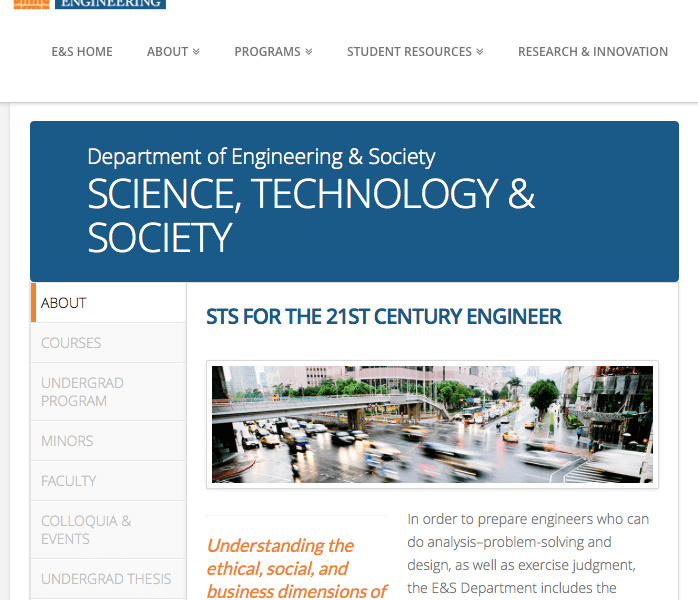Making and Doing STS with Undergraduate Engineers: The UVA Approach
Caitlin Wylie, University of Virginia;Sean Ferguson, Engineering and Society, University of Virginia; Toluwalogo Odumosu, University of Virginia; Rider W Foley, University of Virginia; Benjamin Laugelli, University of Virginia; Peter Westin, University of Virginia; Bryn Whiteley
Boston 2017: Pedagogy

The University of Virginia has one of the few STS programs embedded in an engineering school. As our colleague Deborah Johnson reported in Infusing Ethics into the Development of Engineers (2016), the program’s mission is to empower undergraduate engineers to “develop and demonstrate their capacity for social analysis, ethical reasoning, and written communication.” We hope to enrich the field and culture of professional engineering by releasing socially-aware and well-rounded engineers into the workforce and society. STS faculty provide four semesters of coursework for UVA’s undergraduate engineers. First-year students take a course on the history of technology and innovation that includes hands-on learning, technical writing, rocket pitches, and a group project of creating a patent application. Next, students choose a mid-level course on a variety of specialized STS topics, such as science policy, laboratory studies, anthropology of outer space, ethics of reproductive technologies, and entrepreneurship. Finally, in a year-long course sequence, fourth-year students learn STS theories and methods and then apply them in an STS research paper as a component of their senior thesis in engineering. Many STS scholars teach STEM students, as we do, and we want to create a space at 4S to share ideas, challenges, resources, and inspirations for serving this population of students. Several of our faculty will present “making and doing” activities from STS courses we teach at UVA, as a reflection of the personal and professional skills we help our students develop. Our exhibit will showcase student-produced artifacts, including undergraduate theses, proposals for the physical and social design of an imagined engineering research lab, and videos of students presenting their analyses of sociotechnical issues through the lens of STS theory. Our exhibit will also include faculty-produced lesson plans that demonstrate our pedagogical approaches to engaging engineers in “making and doing” STS. These include group activities about assessing and designing science policy, conducting participant observation in engineering labs, and role-playing games in which students evaluate technologies (e.g., geoengineering, nano tech, solar energy) from different economic, cultural, and political perspectives. We employ these strategies to spark engineering students’ interest in STS, broaden their conception of engineering as a human activity with social inspirations and implications, and help them develop crucial skills of problem definition, information literacy, and communication. Please join us to discuss how to “make and do” STS with undergraduate STEM students.
Published: 01/30/2023
